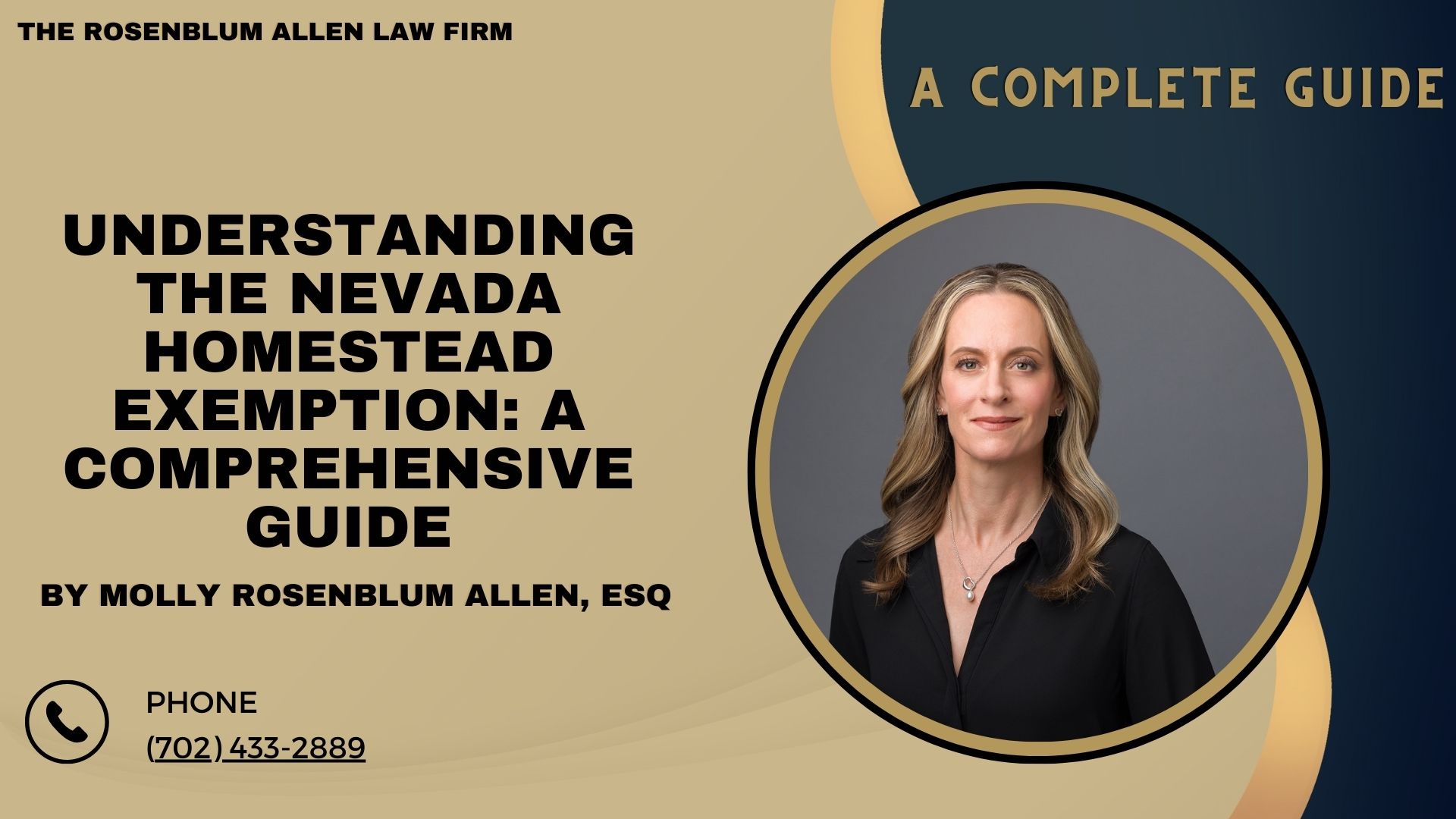Welcome to our comprehensive guide on the Nevada homestead exemption. If you’re a homeowner in Nevada, you must understand this law. It can protect your home equity and has many benefits. This guide covers all you need about the Nevada homestead exemption. It includes its purpose, who is eligible, its benefits, how to file, its limits, and more. So, let’s dive in and explore this important topic together.

What is the Nevada Homestead Exemption?
The Nevada homestead exemption is a law that protects homeowners. It accomplishes this by exempting a portion of their home equity from creditors seeking to seize or sell it to settle specific debts. These include creditor claims or bankruptcy proceedings. It aims to ensure homeowners can keep a place to live. It also helps them protect their main home from money problems.
Definition and Purpose
Homeowners benefit from the homestead exemption to gain security. It provides a certain level of stability. Exempting a portion of the home’s value from creditors helps prevent individuals and families from becoming homeless. It stops them from losing their primary residence due to financial setbacks. The exemption amount varies based on specific criteria outlined by Nevada law.
Protection of Home Equity
One of the primary purposes of the Nevada homestead exemption is to protect a portion of the homeowner’s equity in their primary residence. Equity is the difference between the home’s fair market value and the outstanding mortgage or loans secured by the property. By exempting a portion of this equity, the homeowner can shield it from being used to satisfy certain debts.
Exemption Limits
Nevada law limits the amount of equity protected under the homestead exemption. As of our knowledge cutoff in September 2021, Nevada’s standard homestead exemption limit is $605,000. However, it’s important to note that the exemption amount is subject to change, and it is advisable to consult the updated laws or seek legal advice for the most accurate and current information.
Stay tuned for the following sections, where we’ll discuss the eligibility criteria for the homestead exemption, its benefits, and how to claim it in Nevada.
Eligibility for Homestead Exemption in Nevada
You must meet specific criteria to qualify for the homestead exemption in Nevada. Let’s explore these requirements in detail:
Primary Residence Requirement
The homestead exemption in Nevada applies only to the homeowner’s primary residence, which means the dwelling where they primarily reside and intend to remain. Vacation homes, rental properties, and secondary residences are not eligible for the exemption. It’s crucial to establish that the property in question is your primary residence to qualify for the homestead exemption benefits.
Ownership Requirements
Sole Ownership: If you are the sole owner of the property, you can claim the homestead exemption individually. It’s important to note that only one homestead exemption can be claimed per property.
Joint Ownership with a Spouse: If you own the property jointly with your spouse, you can claim the homestead exemption, doubling the exemption amount. This standard exemption is available to married couples who reside in the property as their primary residence.
Documentation and Filing Requirements
To claim the homestead exemption in Nevada, you must follow specific filing rules. You must provide certain documents. This typically involves the following:
Declaration of Homestead: You must complete and file a Declaration of Homestead form with the county recorder’s office in the county where the property is located. The form requires information about the property, your ownership, and other relevant details.
Supporting Documentation: Along with the Declaration of Homestead form, you may be required to provide supporting documentation, such as proof of residency, proof of ownership, and other documents specified by the county recorder’s office. These documents help establish your eligibility for the homestead exemption.
Timelines and Deadlines: It’s crucial to adhere to the specified timelines and deadlines for filing the homestead exemption. Failure to file within the designated timeframe may result in the loss of the exemption for that particular year. Be sure to check with the county recorder’s office for the specific deadlines in your county.
We’ve covered the eligibility requirements and filing process. Now, let’s explore the benefits of the Nevada homestead exemption in the next section.

Homestead Exemption Benefits
The Nevada homestead exemption offers several benefits to homeowners. Let’s delve into the advantages that this protection provides:
Protection Against Creditors
The homestead exemption has a big benefit. It can shield homeowners from some creditors. The exemption shields a part of the home equity from being seized or sold to pay unsecured debts. These debts include credit card debt, medical bills, and similar obligations. This protection is key. It stops the forced sale of a main home to pay these debts.
Bankruptcy Protection
If you go bankrupt, the homestead exemption can vital. It safeguards your home. It allows you to exempt a part of your home equity from being included in the bankruptcy estate. This means that even if you file for bankruptcy, you can keep your main home up to the exempted amount. This provides a crucial safety net during tough financial times.
Limitations and Exclusions
The homestead exemption offers big benefits. But, it’s essential to know its limits and exclusions. The exemption covers things like mortgages, property taxes, and certain liens. But, it may not cover some debts and obligations. Additionally, the exemption amount is subject to limitations set by Nevada law. Knowing these limits can help you make smart choices about your home and finances.

Determining the Value of Homestead Exemption
Specific calculation methods and factors come into play to determine the value of the homestead exemption in Nevada. Let’s explore these aspects in detail:
Standard Homestead Exemption:
Nevada’s standard homestead exemption amount is subject to change and is determined by state law. As of our knowledge cutoff in September 2021, the legal exemption limit is $605,000. This means up to $605,000 of your home equity can be protected from certain debts.
Disabled or Elderly Person Exemption: Nevada law provides an additional exemption for disabled or elderly persons. You may be eligible for an increased exemption amount if you meet the criteria. The specific details and requirements for this exemption can vary, so it’s advisable to consult the most up-to-date laws or seek legal advice to determine if you qualify.

Factors Affecting Exemption Amount
Several factors can influence the amount of the homestead exemption you can claim. These factors include:
Property Value: The value of your property plays a crucial role in determining the homestead exemption amount. The equity in your home, the difference between the property’s fair market value and any outstanding mortgages or liens, can be protected under the exemption.
Age or Disability Status: As mentioned earlier, disabled or elderly persons may be eligible for an increased exemption in Nevada. The specifics of this exemption, such as age requirements or disability criteria, may differ, so it’s essential to review the relevant laws or consult legal professionals for accurate information.
Income Level: Unlike some states, Nevada does not consider income level as a factor for determining the homestead exemption amount. However, it’s worth noting that your income level may affect your ability to qualify for other types of assistance or programs related to homeownership.
Now we know how to determine the value of the homestead exemption. Let’s move on to the next section. There, we’ll discuss how to claim the Nevada homestead exemption.

How to Claim the Nevada Homestead Exemption
To claim the homestead exemption in Nevada, you must follow a specific filing process. You must also provide the required forms and documents. Let’s explore the steps involved:
Filing Process
Obtain the Declaration of Homestead Form: Begin by obtaining the Declaration of Homestead form, available from the county recorder’s office where your property is located. You may also find the form on the county’s website.
Complete the Form: Carefully complete the Declaration of Homestead form, providing accurate information about your property, ownership, and residency details. Ensure all required fields are correctly filled to avoid delays or complications.
Gather Supporting Documentation: Along with the Declaration of Homestead form, you may need to provide supporting documentation as required by the county recorder’s office. This can include proof of residency, proof of ownership, identification documents, and any other documents specified by the office.

Required Forms and Documents
Declaration of Homestead: The Declaration of Homestead form is a crucial document establishing your intent to claim the homestead exemption. Ensure that you accurately complete and sign the form.
Supporting Documentation: The specific documents required may vary depending on the county. Commonly requested records include proof of residency (utility bills, driver’s license, etc.), proof of ownership (deed, title, etc.), and identification documents (such as a government-issued ID).
Timelines and Deadlines
Knowing the timelines and deadlines associated with claiming the homestead exemption is essential. The filing period for the homestead exemption usually opens on January 1st. It closes on June 30th each year. But, you must verify the deadlines with the county recorder’s office. They may be different in each county.
Follow the proper filing process. Submit the needed forms and documents on time. Then, you can claim the Nevada homestead exemption and enjoy its benefits. This section will explore the link between the homestead exemption and property taxes.

Homestead Exemption and Property Taxes in Nevada
The homestead exemption in Nevada can have implications for property taxes. Let’s explore the link. It’s between the homestead exemption and property taxes in the state.
Property Tax Overview
Local governments assess property taxes to fund public services and infrastructure. The amount of property tax you owe is typically based on the estimated value of your property. County assessors determine property taxes in Nevada.
Homestead Exemption and Property Tax Reduction
The homestead exemption in Nevada does not directly reduce your property tax rate. But, it can provide some relief. It lowers your property’s assessed value for calculating property taxes.
Calculation of Property Taxes with Homestead Exemption
To understand how the homestead exemption affects property taxes, let’s consider an example:
Assessed Value: Suppose your property has an estimated value of $300,000.
Homestead Exemption: If you are eligible for the Nevada homestead exemption and the exemption amount is $605,000, the assessed value of your property for property tax purposes would be reduced to $300,000 – $605,000 = $0.
Property Tax Calculation: With an assessed value of $0, your property tax liability may be significantly reduced or even eliminated.
Additional Property Tax Relief Programs
Also to the homestead exemption, Nevada offers more property tax relief programs. They can help eligible homeowners lower their property tax burden. These programs include:
Property Tax Abatement: The program provides relief to low-income seniors and disabled individuals who meet certain income and residency requirements. It offers a reduction in property taxes or a refund of a portion of the taxes paid.
Property Tax Assistance: The Property Tax Assistance program assists low-income seniors and disabled individuals with their property tax obligations. Eligible homeowners may receive a partial reimbursement of their property taxes.
These programs vary by county. They have different availability and details. To see if you are eligible, and to learn more, contact your local county assessor’s office.
Next, we’ll discuss the limits. We’ll also cover the things to consider for the homestead exemption in Nevada.

Limitations and Considerations of the Homestead Exemption
The homestead exemption offers valuable protections. But, it’s essential to know its limits and factors. Let’s explore these factors:
Debts Not Covered
The homestead exemption does not protect against all types of debts. Some obligations are not covered by the exemption, including:
Mortgages and Home Equity Loans: The homestead exemption does not protect against debts secured by your property, such as your mortgage or home equity loan. If you default on these loans, your lender may initiate foreclosure proceedings.
Property Taxes and Assessments: The homestead exemption does not exempt you from paying property taxes or special assessments imposed by local governments.
Federal Tax Liens: In some instances, federal tax liens may take precedence over the homestead exemption, allowing the Internal Revenue Service (IRS) to seize and sell your property to satisfy unpaid federal taxes.
Change of Residency
You may lose the homestead exemption if you stop using the property as your main home. Or, if you move out of Nevada. To avoid problems, you must tell the county recorder’s office. You must tell them if your residency status changes.
Impact on Future Homestead Exemptions
If you sell your current home and buy a new one, you must reapply for the exemption on the new property. The exemption does not automatically transfer to a new home.
Legal and Professional Advice
Understanding the homestead exemption and its implications is complex. It may must legal or professional help. You should consult a lawyer or other professionals. They can give advice tailored to your situation.
Understanding the limits and issues of the homestead exemption lets you make informed choices. It also helps you protect your main home.
In the next section, we’ll provide a summary. Then, we’ll give concluding remarks to wrap up our guide on the Nevada homestead exemption.

Breaking It All Down
In conclusion, the Nevada homestead exemption is a valuable legal protection. It lets homeowners keep a part of their property’s value from certain creditors and debts. You can enjoy the homestead exemption. You just need to meet the residency rules and use the property as your main house.
The homestead exemption does not cut property tax rates. But, it can lower your property’s assessed value for tax calculations. This gives some relief. Also, Nevada offers more property tax relief programs. They help eligible homeowners cut their property taxes even more.
You must be aware of the limits and issues with the homestead exemption. It does not cover some debts. You can lose it if you move. And, you must reapply if you buy a new primary house. Seeking legal or professional advice can help you navigate these complex issues. It can also help you make informed choices.
Consider the newest laws. Or, seek professional guidance for accurate details. They can give personalized information on the Nevada homestead exemption. Understanding the homestead exemption and using it well can protect your home. It can also cut your costs.

Frequently Asked Questions
What is the purpose of the Nevada homestead exemption?
The Nevada homestead exemption aims to protect a portion of a homeowner’s equity in their primary residence from specific debts and creditors.
How do I determine if my property qualifies as my primary residence?
Your primary residence is typically where you live most of the time. Establishing residency can involve factors like voter registration, driver’s license, and utility bills.
Can I claim the homestead exemption if I recently purchased a home in Nevada?
Yes, you can claim the homestead exemption if you meet eligibility criteria and use the property as your primary residence.
Is there a limit to the property’s value that can qualify for the homestead exemption?
In Nevada, there is no specific value limit for qualifying for the homestead exemption. However, maximum exemption amounts are based on categories like age or disability status.
Can the homestead exemption protect my property from all debts?
The homestead exemption primarily protects against certain unsecured debts. It does not cover debts such as mortgages, home equity loans, property taxes, or federal tax liens.
Can I apply for the homestead exemption if I am behind on my property taxes?
Yes, you can apply for the homestead exemption even if you’re behind on property taxes. However, it doesn’t exempt you from paying them.
Do I need an attorney to apply for the homestead exemption?
While not required, legal advice can help navigate complexities and ensure all requirements are met.
Can I lose the homestead exemption if I move out of Nevada?
If you no longer use the property as your primary residence or move out of Nevada, you may lose the exemption.
Can I transfer my homestead exemption to a new home if I sell my current property?
No, the exemption doesn’t automatically transfer. You must reapply for the new property.
Are there income limits to qualify for the homestead exemption in Nevada?
No, income level is not a factor in determining eligibility or the amount of the homestead exemption in Nevada.

Glossary
Homestead Exemption: A legal protection that allows homeowners to safeguard a portion of their property’s equity from specific debts and creditors. It helps protect the homeowner’s primary residence from being seized to satisfy certain debts.
Equity: The value of a property minus any outstanding mortgage or liens. The equity represents the owner’s interest or ownership stake in the property.
Primary Residence: The property where a person lives most of the time and is considered their main home. It is typically the property eligible for the homestead exemption.
Residency Requirements: Specific criteria that determine whether a person qualifies as a resident of Nevada to claim the homestead exemption. These criteria may include voter registration, driver’s license, and utility bills.
Assessed Value: The value assigned to a property by the county assessor to calculate property taxes. The estimated value may be different from the market value of the property.
Property Tax Relief Programs: Additional programs are offered in Nevada to assist eligible homeowners in reducing their property tax burden further. These programs may include Property Tax Abatement and Property Tax Assistance programs.
Debt: An amount of money owed by one party (the debtor) to another (the creditor). In the context of the homestead exemption, certain types of debts may be protected, while the exemption does not cover others.
Mortgage: A loan secured by a property, typically used to finance the purchase of the property. The property serves as collateral for the mortgage loan.
Property Tax Liability: The property taxes owed by the homeowner to the local government or county. The property tax liability is calculated based on the assessed value of the property and the applicable tax rates.
County Recorder’s Office: An office within the county government responsible for maintaining public records related to property ownership, including the homestead exemption. Homeowners may need to contact the county recorder’s office to apply for or update their homestead exemption.

Additional Resources for You
Las Vegas Estate Planning Attorney: For all your estate planning needs in Las Vegas, you can rely on our experienced attorney. Visit Las Vegas Estate Planning Attorney for more information.
Las Vegas Trust Attorney: If you require assistance with trust planning and administration, our trust attorney is ready to help. Find more details at Las Vegas Trust Attorney.
Tips On Estate Planning: Get valuable tips and insights on estate planning by visiting Tips On Estate Planning.
Estate Planning Checklist: Ensure you cover all the important aspects of estate planning with our comprehensive checklist. Access the checklist at Estate Planning Checklist.
Making a Will: If you need guidance on the process of making a will, our resources can provide you with the necessary information. Learn more at Making a Will.
Estate Planning Services: Our firm offers a wide range of estate planning services to meet your individual needs. Discover more about our services at Estate Planning Services.
Estate Planning Mistakes: Learn about common estate planning mistakes to avoid to ensure your assets are protected and your wishes are honored. Find out more at Estate Planning Mistakes.
Estate Planning Probate: If you require assistance with estate planning and probate matters, our experienced attorneys are here to help. Visit Estate Planning Probate for more information.

Outside Resources for You
American Bar Association – Estate Planning Resources: The American Bar Association provides a wealth of resources on estate planning, including articles, guides, and tools. Visit their website at https://www.americanbar.org/groups/real_property_trust_estate/resources/estate_planning/.
AARP – Estate Planning and Wills: AARP offers comprehensive information on estate planning and wills, covering topics such as creating a will, naming beneficiaries, and understanding estate taxes. Explore their resources at https://www.aarp.org/money/estate-planning/.
EstatePlanning.com: EstatePlanning.com is a valuable resource for individuals looking for estate planning information and services. They provide articles, guides, and tools to help you navigate the estate planning process. Visit their website at https://www.estateplanning.com/.
Nolo – Estate Planning: Nolo offers a wide range of estate planning resources, including articles, books, and software. They cover various aspects of estate planning, such as wills, trusts, probate, and estate taxes. Explore their resources at https://www.nolo.com/legal-encyclopedia/estate-planning.
Estate Planning Council: The Estate Planning Council is a professional organization dedicated to promoting excellence in estate planning. Their website provides resources for both professionals and individuals seeking estate planning information. Learn more at https://www.estateplanningcouncil.org/.
Estate Planning Magazine: Estate Planning Magazine offers articles, news, and insights on estate planning topics. It covers a wide range of subjects, including wills, trusts, estate administration, and tax planning. Visit their website at https://www.estateplanningmagazine.com/.
Estate Planning Answers: Estate Planning Answers is a website that provides comprehensive information and resources on estate planning. It covers various topics, including wills, trusts, powers of attorney, and healthcare directives. Explore their resources at https://www.estateplanninganswers.org/.

A Special Message from Our Lead Attorney, Molly Rosenblum Allen, Esq

Dear Reader,
Thank you for taking the time to explore our estate planning resources. I hope you found the information valuable. It helped you understand the importance of estate planning and its many aspects.
If you have questions or need help with your situation, please contact me and my team. We have a wealth of experience in estate planning matters and are ready to guide you through the process.
To start, take these steps to secure your future and protect your assets. Please call (702) 433-2889. Our team remains dedicated. They are here to listen to your needs and answer your questions. They will give you personalized guidance tailored to your circumstances.
We understand that estate planning is crucial. We are committed to caring for you and providing expertise. Please note that our services are not free. But, we assure you that we are committed to delivering high-quality legal help.
We look forward to speaking with you and assisting you in your estate planning journey.
Sincerely,
Molly Rosenblum Allen, Esq.




